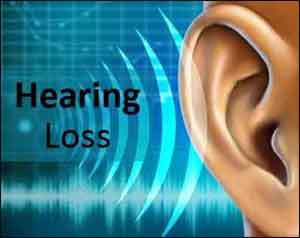- Home
- Editorial
- News
- Practice Guidelines
- Anesthesiology Guidelines
- Cancer Guidelines
- Cardiac Sciences Guidelines
- Critical Care Guidelines
- Dentistry Guidelines
- Dermatology Guidelines
- Diabetes and Endo Guidelines
- Diagnostics Guidelines
- ENT Guidelines
- Featured Practice Guidelines
- Gastroenterology Guidelines
- Geriatrics Guidelines
- Medicine Guidelines
- Nephrology Guidelines
- Neurosciences Guidelines
- Obs and Gynae Guidelines
- Ophthalmology Guidelines
- Orthopaedics Guidelines
- Paediatrics Guidelines
- Psychiatry Guidelines
- Pulmonology Guidelines
- Radiology Guidelines
- Surgery Guidelines
- Urology Guidelines
Late-life hearing loss may lead to depression : JAMA

A new study found that in the elderly age-related hearing loss may lead to symptoms of depression; the greater the hearing loss, the greater the risk. The findings suggest that treating underrecognized and undertreated age-related hearing loss among all elders could be one way to head off late-life depression.
The study has been published online in JAMA Otolaryngology-Head & Neck Surgery.
Age-related hearing loss is one of the commonest chronic condition in older adults. It is known to raise the risk of other conditions, such as cognitive impairment and dementia. But there are a few large studies asking whether hearing loss may lead to depression in the elderly, particularly in Hispanics, a group in which depression may be underdiagnosed because of language and cultural barriers.
"Most people over age 70 have at least mild hearing loss, yet relatively few are diagnosed, much less treated, for this condition," says lead author Justin S. Golub, MD, MS, assistant professor of otolaryngology-head & neck surgery at Columbia University Vagelos College of Physicians and Surgeons. "Hearing loss is easy to diagnose and treat, and treatment may be even more important if it can help ease or prevent depression."
The researchers analyzed health data from 5,239 individuals over age 50 who were enrolled in the Hispanic Community Health Study/Study of Latinos. Each participant had an audiometric hearing test -- an objective way to assess hearing loss -- and was screened for depression.
The researchers found that individuals with mild hearing loss were almost twice as likely to have clinically significant symptoms of depression than those with normal hearing. Individuals with severe hearing loss had over four times the odds of having depressive symptoms.
The study looked for an association at a single point in time, so it can't prove that hearing loss causes depressive symptoms. "That would have to be demonstrated in a prospective, randomized trial," says Golub. "But it's understandable how the hearing loss could contribute to depressive symptoms. People with hearing loss have trouble communicating and tend to become more socially isolated, and social isolation can lead to depression."
Although the study focused on Hispanics, the results could be applied to anyone with age-related hearing loss, according to the researchers. "In general, older individuals should get their hearing tested and consider treatment if warranted," says Golub.
For more details click on the link: DOI: 10.1001/jamaoto.2018.3270

Disclaimer: This site is primarily intended for healthcare professionals. Any content/information on this website does not replace the advice of medical and/or health professionals and should not be construed as medical/diagnostic advice/endorsement or prescription. Use of this site is subject to our terms of use, privacy policy, advertisement policy. © 2020 Minerva Medical Treatment Pvt Ltd